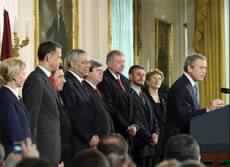- Author:
& Agencies - Section:
WORLD HEADLINES
7 Nations Joining NATO As Mission Evolves

As seven new members prepare to join, NATO is looking less like a military alliance and more like a political club. That suits the United States just fine, especially when it comes to finding European allies that will lend a friendly ear - or even some troops - to U.S. foreign policy pursuits. But it remains to be seen how well this new, bulky NATO can carry out the military functions that have made it unique.
How well these new allies will fit in alongside longtime NATO stalwarts is another open question.
Bush seemed to sense those possibilities. Thursday, he urged NATO allies to welcome the new members quickly, saying, "These nations will make NATO stronger, and we need that strength for all the work that lies ahead."
Sixteen of NATO's 19 member nations have yet to give a green light to Bulgaria, Estonia, Latvia, Lithuania, Romania, Slovakia and Slovenia, all former communist and socialist nations that have made the transition into free-market democracy.
Still, those nations - many of them giddy over the prospect of joining NATO - made clear they want the door left open to other aspirants, particularly Albania, Croatia and Macedonia.
"We do not debate NATO's relevance. We are confident in its value and role," said Romanian Foreign Minister Mircea Geoana, speaking Thursday for all seven. "All countries willing and able to meet and further NATO's principles and standards should have the chance of joining the alliance."
That, in itself, is what makes NATO expansion a good thing, given the way the world has changed since NATO was created in 1949, said Anthony Cordesman, an expert at the Center for Strategic and International Studies. The military alliance was formed largely to discourage the Soviet Union from attacking Western Europe.
"There's no reason to preserve an alliance to deal with a threat that doesn't exist, and there's a reason to expand an alliance to deal with a problem that does exist," Cordesman said. "The question is never the numbers, it is the members. What is the end result in terms of trans-Atlantic security and stability? As long as the institution encourages those goals, it's a good thing."
There are downsides to NATO expansion. One is a clause in the NATO treaty that says NATO members must come to the defense of any NATO member under attack. That clause was invoked on behalf of the United States after the Sept. 11, 2001 attacks. Now that it applies to a greater number of countries, it means the United States could get drawn into more skirmishes.
"We really are at the point of questioning whether, at a certain point, you get diminishing returns, and it becomes an alliance in name rather than fact," said Brookings Institution analyst Susan Rice. "There is a concern that the larger it gets, the more we dilute its operability."
Michael Mandelbaum, an expert on NATO and author of "The Ideas That Conquered the World," said an expanded NATO is not capable of being a serious military presence.
"I wouldn't go so far as to say it is useless, but it's hard to see an important use for it," Mandelbaum said. "If it does serve as a peacekeeping force for Iraq, it could have a new lease on life. So the greatest hope for NATO is that it can serve for peacekeeping."
The new kids on the NATO block could prove themselves by showing their forces can operate smoothly alongside
American forces, should they be pressed into duty. Their presence means a more equitable distribution of duties among NATO allies, both in terms of missions and money, said Heritage Foundation expert Peter Brookes.
"One of the things we're certainly looking at is making this new NATO more flexible than it has been in the past," Brookes said. "Certainly any organization that gets very large, sometimes it becomes very difficult for it to be decisive. The important thing here is the leadership of the United States in this forum."
**PHOTO CAPTION***
George Bush welcomes foreign ministers of the seven eastern European nations preparing to join NATO, during remarks in the East Room of the White House in Washington, Thursday, May 8, 2003. Left to right: Foreign Minister of Estonia Kristiina Ojuland, Foreign Minister of Romania Mircea Geoana, Foreign Minister of Lithuania Antanas Valionis, U.S. Secretary of State Colin Powell (news - web sites), Foreign Minister of Slovakia Eduard Kukan, Foreign Minister of Slovenia Dimitrij Rupel, Foreign Minister of Bulgaria Solomon Passy, and Foreign Ministern of Latvia Sandra Kalniete. (AP Photo/J. Scott Applewhite)


 Home
Home Discover Islam
Discover Islam Quran Recitations
Quran Recitations Lectures
Lectures
 Fatwa
Fatwa Articles
Articles Fiqh
Fiqh E-Books
E-Books Boys & Girls
Boys & Girls  Women
Women









